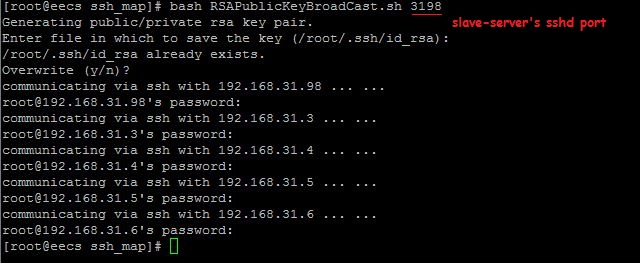当我们需要控制一个局域网中的很多台服务器时,一个简单的全局操作可能会被放大地异常繁琐,这时我们就会需要新的工具来快速完成这种工作。
我们将使用ssh客户端提供的一些工具来快速完成这一开发工作,我们的开发平台是GNU/Linux。
下面即是我们整个系统的鸟瞰图:

第一个工具:
要建立非交互式的ssh连接,采用客户端公钥认证登录的方式是一种很棒的方法。
第一个工具的功能是,将本地ssh客户端的公钥追加到各SlaveServers的/root/.ssh/authorized_keys文件中,以实现ssh公钥登录的认证。
具体实现如下:
SlaveServer.conf
1 #global var: glServerList 2 glServerList="192.168.31.98 3 192.168.31.3 4 192.168.31.4 5 192.168.31.5 6 192.168.31.6"
RSAPublicKeyBroadCast.sh
1 #!/bin/bash 2 3 . SlaveServer.conf 4 5 function SSH_RSAPublicKeyBroadCast () { 6 # $1 : sshd port like : 3198 7 ssh-keygen 8 declare RSApk_path=/root/.ssh/id_rsa.pub 9 declare clientRSApk=`cat ${RSApk_path}` 10 declare i 11 for i in $glServerList 12 do 13 echo "communicating via ssh with $i ... ..." 14 ssh -o GSSAPIAuthentication=no -p "$1" root@${i} "mkdir ~/.ssh ; echo ${clientRSApk} >> ~/.ssh/authorized_keys" 15 done 16 } 17 SSH_RSAPublicKeyBroadCast "$1"
其使用、验证请看附录。
第二个工具:
当我们需要将一个本地文件传送到所有SlaveServer的一个相同路径时,我们便需要一个工具来完成这样的任务。
例如:当我们想统一调整所有SlaveServer的sshd服务的参数时,我们需要改变所有SlaveServer上的/etc/ssh/sshd_config文件,这时第二个工具将发挥它的威力。
具体实现如下:
FileBroadCast.sh
1 #!/bin/bash 2 3 . SlaveServer.conf 4 5 function SSH_FileBroadCast () { 6 # $1 : sshd port like : 3198 7 # $2 : src :local file path like /etc/ssh/sshd_config 8 # $3 : dest: remote server file path like /etc/ssh/sshd_config 9 declare i 10 for i in $glServerList 11 do 12 echo "communicating via ssh with $i ... ..." 13 scp -o GSSAPIAuthentication=no -P "$1" "$2" root@${i}:${3} 14 done 15 } 16 17 SSH_FileBroadCast "$1" "$2" "$3"
其使用、验证请看附录。
第三个工具:
在完成第二个工具后,我们有了向所有SlaveServer传送文件的能力,但是,如何向其所有发送"service sshd reload"命令呢?
于是,我们的第三个工具,CommandBroadCast入场。
具体实现如下:
CommandBroadCast.sh
1 #!/bin/bash 2 3 . SlaveServer.conf 4 5 function SSH_CommandBroadCast () { 6 # $1 : sshd port like : 3198 7 # $2 : command like ' service sshd reload ' 8 declare i 9 for i in $glServerList 10 do 11 echo "communicating via ssh with $i ... ..." 12 ssh -o GSSAPIAuthentication=no -p "$1" root@${i} "${2}" 13 done 14 } 15 16 SSH_CommandBroadCast "$1" "$2"
其使用、验证请看附录。
第四个工具:
第三个工具可以让我们控制所有的SlaveServer执行我们指定的一段命令,但是,如果我们想让它们执行本地的一个bash脚本呢?
如此,第四个工具的功能是命令所有SlaveServer执行我们在本地定义的一个bash脚本文件。
具体实现如下:
AllSlaveExecLocalScripts.sh
#!/bin/bash . SlaveServer.conf function SSH_RemoteServerExecLocalScripts () { # $1 remoteServerArgs like: root@192.168.31.2 # $2 remoteServer SSH Daemon's port like: 3198 # $3 local bash scripts you want the remoteServer to exec declare tempFile=`mktemp` #local tmp declare remoteTmpDir if ssh -o GSSAPIAuthentication=no -p "$2" "$1" 'declare tempDir=`mktemp -d` ; chmod 700 $tempDir ; chown root:root $tempDir ; cd $tempDir ; unset tempDir ; pwd ' 1> $tempFile then remoteTmpDir=`tail -1 $tempFile` scp -o GSSAPIAuthentication=no -P "$2" "$3" ${1}:$remoteTmpDir 1>/dev/null ssh -o GSSAPIAuthentication=no -p "$2" "$1" " bash ${remoteTmpDir}/* ; rm -fr ${remoteTmpDir} " rm -f $tempFile return 0 else rm -f $tempFile echo "connect error:exit" return 1 fi } function SSH_BroadCastExecLocalScripts () { # $1 : sshd port like : 3198 # $2 local bash scripts you want the remoteServer to exec declare i for i in $glServerList do echo "communicating via ssh with $i ... ..." SSH_RemoteServerExecLocalScripts "$i" "$1" "$2" done } SSH_BroadCastExecLocalScripts "$1" "$2"
至此,我们的四个工具已经开发完成,接下来请看附录中的实验展示。
附录:
关于实验环境的配置情况,请查看文章《构建一个完整的DNS系统》,这里不再赘述。

1.控制所有SlaveServer对192.168.31.2主机进行ssh公钥登录认证:

2.由于SlaveServer们的sshd参数设置问题,导致ssh登录连接的建立“异常”缓慢,所以我们需要重新调整所有SlaveServer的sshd配置文件:

3.向所有SlaveServer发送'service sshd reload'命令:

 4.命令所有SlaveServer执行本地主机192.168.31.2上的一个脚本:
4.命令所有SlaveServer执行本地主机192.168.31.2上的一个脚本:
ip_host.sh
1 #!/bin/bash 2 3 declare host_ip=`ifconfig | grep -Eo 'inet addr:<(([0-9]|[1-9][0-9]|1[0-9]{2}|2[0-4][0-9]|25[0-5]).([0-9]|[1-9][0-9]|1[0-9]{2}|2[0-4][0-9]|25[0-5]).([0-9]|[1-9][0-9]|1[0-9]{2}|2[0-4][0-9]|25[0-5]).([0-9]|[1-9][0-9]|1[0-9]{2}|2[0-4][0-9]|25[0-5]))>' | grep -Eo '<(([0-9]|[1-9][0-9]|1[0-9]{2}|2[0-4][0-9]|25[0-5]).([0-9]|[1-9][0-9]|1[0-9]{2}|2[0-4][0-9]|25[0-5]).([0-9]|[1-9][0-9]|1[0-9]{2}|2[0-4][0-9]|25[0-5]).([0-9]|[1-9][0-9]|1[0-9]{2}|2[0-4][0-9]|25[0-5]))>' | head -1` 4 5 echo "host ip is : $host_ip" 6 7 mpstat

至此,我们的工具实验展示结束。如有问题或建议,欢迎讨论 :)